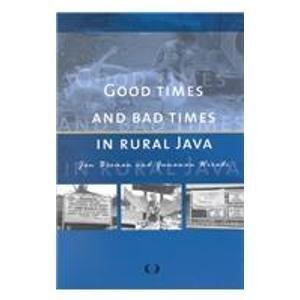
Good Times and Bad Times in Rural Java: Case Study of Socio-Economic Dynamics in Two Villages Towards the End of the Twentieth Century
No ratings yet
Format
Paperback
Pages
344
Language
English
Published
Jan 1, 2002
Publisher
Brill
Edition
Illustrated
ISBN-10
9067181870
ISBN-13
9789067181877
Description
In a compelling exploration of rural Java, Jan Breman and Gunawan Wiradi delve into the socio-economic dynamics that shaped life in two distinct villages towards the end of the twentieth century. Through detailed case studies, the authors illustrate the interplay of tradition and change, highlighting how external influences such as global economic shifts and local cultural practices shaped the livelihoods and communal structures of these communities.
The narrative unfolds with a rich tapestry of life, drawing readers into the daily rhythms and struggles faced by the villagers. It examines the impact of both good times and bad times, offering insights into how resilience and adaptation play crucial roles in navigating socio-economic challenges. The authors emphasize the importance of local agency, showcasing how villagers respond to changes and uncertainties with creativity and resourcefulness.
By grounding their analysis in extensive field research and historical context, Breman and Wiradi present a nuanced understanding of rural socio-economics. Their meticulous documentation and thoughtful reflections invite readers to consider the broader implications for rural development, making this work a vital resource for anyone interested in the complexities of life in Southeast Asia.
With a thorough bibliographical reference and index, the study serves as a solid foundation for further research, inviting readers to immerse themselves in the rich yet challenging realities of rural Java. The voices of the villagers resonate throughout the work, offering a human perspective on economic and social transformations that are often overlooked in broader discourse.
The narrative unfolds with a rich tapestry of life, drawing readers into the daily rhythms and struggles faced by the villagers. It examines the impact of both good times and bad times, offering insights into how resilience and adaptation play crucial roles in navigating socio-economic challenges. The authors emphasize the importance of local agency, showcasing how villagers respond to changes and uncertainties with creativity and resourcefulness.
By grounding their analysis in extensive field research and historical context, Breman and Wiradi present a nuanced understanding of rural socio-economics. Their meticulous documentation and thoughtful reflections invite readers to consider the broader implications for rural development, making this work a vital resource for anyone interested in the complexities of life in Southeast Asia.
With a thorough bibliographical reference and index, the study serves as a solid foundation for further research, inviting readers to immerse themselves in the rich yet challenging realities of rural Java. The voices of the villagers resonate throughout the work, offering a human perspective on economic and social transformations that are often overlooked in broader discourse.
Reviews
Reading Log
No reading logs found
Start tracking your reading progress to see logs here
Add Your First Reading LogNotes
Transaction Log
No transaction logs found
Start tracking your book transactions to see logs here
Add Your First Transaction Log